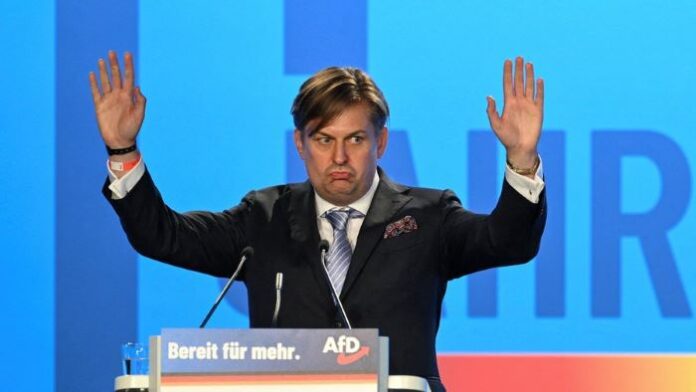Marine Le Pen‘s decision to split with the Alternative for Germany (AfD) party was prompted by a controversial statement by its leading election candidate, Maximilian Krah. In an interview, Krah had remarked that ‘SS were not all criminals’, a statement that sparked widespread condemnation.
Back in January, Le Pen warned the AfD leadership about her intentions to dissolve the Identity and Democracy (ID) group in the European Parliament if the German far-right party continued to move towards extremist positions.
The rupture between the French National Rally (Rassemblement National – NR) and AfD is not just a political event, but a potential catalyst for significant developments in the far-right landscape across Europe.
In a significant move that aligns the ID with the French presidential candidate, the group announced today that it has excluded AfD from its ranks, a decision that will undoubtedly impact the European political landscape.
“The Bureau of the Identity and Democracy Group in the European Parliament has decided today to exclude the German delegation, AfD, with immediate effect. The ID Group no longer wants to be associated with the incidents involving Maximilian KRAH, head of the AfD list for the European elections,” stated the ID’s leadership today.
The crisis in Le Pen’s relations with the German far-right party emerged in January after a secret far-right meeting in Potsdam. The meeting envisaged the transfer to North Africa of numerous “unassimilated German citizens” of foreign origin, a project named “remigration.”
Le Pen immediately condemned such actions and asked AfD leadership for explanations.
However, not all in AfD leadership felt uncomfortable with Le Pen’s declaration. Several leading members of the German party embrace such extremist positions.
In addition, some other parties in the ID group, such as the Austrian FPÖ, or sympathising AfD, like the Bulgarian Revival (Vazrazhdane), share similar extremist views.
The ID group includes Le Pen’s party, the Italian League, the FPÖ, the Portuguese Chega, the Dutch Party of Freedom (PVV), the Belgian Vlaams Belang, the Czech Freedom and Direct Democracy (SPD), the Conservative People’s Party of Estonia (EKRE) and the Danish People’s Party (DF).
Nevertheless, it is unclear how many of these parties agree with AfD’s “remigration” project and how many will follow the Germans if the AfD decides to form another far-right group in the European Parliament.
As polls indicate, some ID parties will perform much better than in the 2019 elections. Thus, the developments following the exclusion of AfD matter. The only option for the AfD is to seek to form a proper Group in the European Parliament after June. Parties with similar views will indeed enter the Parliament. However, the AfD must recruit at least 23 members (MEPs) from seven countries to create a group in the Parliament. It’s not an impossible task.

